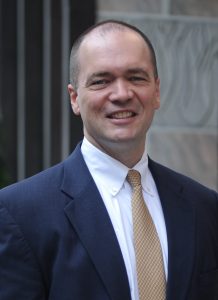Professor Scott Gaylord will help guide the North Carolina Chief Justice's Commission on Professionalism in promoting “appropriate professional behavior … respect for others, and a commitment to the values underpinning the rule of law and administration of justice.”

North Carolina’s top jurist has named an Elon Law faculty member to a commission that supports activities aimed at building good character and virtuous attitudes in the state’s legal community.
Chief Justice Paul Newby of the Supreme Court of North Carolina appointed Professor Scott Gaylord to the North Carolina Chief Justice’s Commission on Professionalism, established in 1998 to “provide ongoing attention and assistance to ensure the practice of law remains a high calling, dedicated to the service of clients and the public good.”
Gaylord’s three-year term will see him work closely with Newby, trial and appellate judges, and select North Carolina lawyers on programs that:
- Encourage lawyers and judges to improve the administration of justice;
- Grow professionalism education; and
- Expand public access to the state’s justice system, among other tasks
“Scott Gaylord’s unique qualifications make him an ideal choice for the commission,” Newby said. “Professor Gaylord has distinguished himself as a lawyer and as an educator. The mission of the Chief Justice’s Commission on Professionalism has always been to enhance professionalism among North Carolina’s judges, lawyers, and law students, and with Professor Gaylord’s background and experience, he will be a great addition to the commission.”
Gaylord joined the Elon Law faculty in 2007 and served as the Jennings Professor and Emerging Scholar from 2013-15. He previously practiced with the Charlotte firm of Robinson, Bradshaw & Hinson, working on complex civil and commercial litigation in both state and federal courts, and prior to his work at the firm, he served as a law clerk to Judge Edith Jones on the Fifth Circuit Court of Appeals.
Gaylord’s scholarship and teaching focus on constitutional law, with a particular emphasis on equal protection, due process, speech, and religion issues. His articles on corporate free exercise and First Amendment speech have led to numerous amicus briefs to the Supreme Court of the United States and federal circuit courts across the country.
He received his master’s and doctoral degrees in philosophy from the University of North Carolina at Chapel Hill and is a summa cum laude graduate of Notre Dame Law School, where he was the Book Review Editor for the law review and received the Dean Joseph O’Meara Award as salutatorian.


